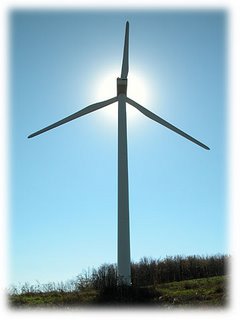Net Energy — Ouch.

I’m still mulling over the conclusions that could be drawn from last week’s forum, “Climate Change and the Coming Energy Crisis.” Actually, there was too little debate among the panelists to permit any conclusion to arise – certainly not any consensus. I wish now that we had left more time for that kind of conversation. As it stands, I have to reach conclusions for myself — and I don’t like the options.
Most, if not all, panelists agreed that there already exist technologies that could reduce CO2 emissions by up to 80 percent — if....
Of course, the “ifs” are multiple and challenging. The worst “if” is that there may not be enough energy around to construct adequate systems such as windmills and solar power by the time we accept the necessity of doing so. This is the objection of the “peak oil” theorists. The problem arises from the concept of “net energy” or EROEI (energy return on energy investment) — how much energy you can obtain for every unit of energy you put into getting, processing, and transporting it.
Net energy varies enormously from one type of fuel to another. For the best oil well, it can be 100 — you get 100 units of energy out for every unit of energy you put into searching for oil, drilling, pumping, transporting, refining it, and so on. But all the alternative fuels receive far poorer payoffs. Thus corn ethanol fuel has been estimated to yield an energy output: input ratio of only 1.6.
The implications of this gap are serious. I can’t find firm estimates of the net energy of other sources of energy — wind, geothermal, solar, and the like — but they are probably in the single-digits.
On the other hand, the truly nasty sources have considerably better net energy levels. Coal is quite high, depending on such factors as the depth of the mine. Nuclear is high — at least when high grade ore is used.
So the dilemma is this: In a few years, oil will be too scarce to meet our needs. If we continue to need a lot of energy (and we will — even if we become more efficient and conservationist — because the human population will keep increasing for many years), we will need to invest VAST amounts of energy in the systems that will produce renewable, non-carbon-emitting energy (such as wind, solar, and biomass), or else we’ll have to choose one of the nasty sources that can be produced with less input: coal and nuclear.
If we can get those alternative, renewable sources up and running in adequate amounts, we’ll be okay. But where are we going to get the energy to do that after the oil is gone? We won’t. So we have to build these alternative systems right away. (I’m ignoring here the other environmental problems that will result from building them successfully — such as the birds that will run into huge wind farms.)
If we don’t get cracking, we’ll lack the materials to get the renewable, sustainable sources of energy going, so we’ll have to settle for something worse — coal or nuclear.
Coal is abundant, but it is truly foul stuff. Mining it (or tar sands, for that matter) wrecks the environment, but the worst thing is that it’s the dirtiest form of energy. It emits carbon dioxide and a huge amount of other chemicals and particulates into the air. What we’re hearing now is the hope that it can be cleaned and made useful. So far, those technologies are not well advanced. The one I find most appealing is something called “greenfuel” which involves expelling the CO2 through a tank of algae that grow by living off the stuff. You keep harvesting the algae and putting new feedstock in. Let’s hope this brings the emissions down enough to make it worthwhile. It’s a costly process, as are some of the other proposed ways of managing coal’s emissions, such as pumping them into empty mines or into the bottom of the ocean.
The remaining possibility is nuclear — but who wants that? It’s a hideous prospect, and not actually as cheap as we are told. Uranium ore is already getting scarce, so the power plants are resorting to lower grade ore. Net energy declines. Eventually, when you have to dismantle old nuclear plants and dispose of the waste, the total cost is higher than alternative sources of energy.
But suppose the drop-off in oil production is as steep as the peak oil believers say. If so, then there may be insufficient energy even to create the alternative fuel systems we all want. We’ll have some terrible choices to make: nuclear or coal? Either that or accept James Lovelock’s prediction — that most of the human population will surely die off, leaving a minority still surviving in the Arctic, which will be comfortably warm.
Mind you, I don’t believe this stuff. I also don’t disbelieve it. I am not sure that sufficient evidence exists yet to make any sound predictions. I want that evidence, one way or the other. You should want it too.



0 Comments:
Post a Comment
<< Home